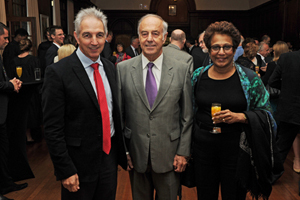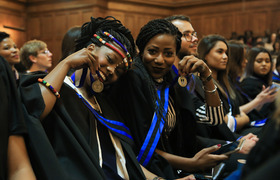UCT on the Global Stage
30 April 2014
Vice-Chancellor Dr Max Price was recently elected chair of the World Universities Network (WUN) Partnership Board - the first from the Global South - signalling WUN's coming of age and a new opportunity for UCT on the global stage.
The World Universities Network (WUN) - a collection of 17 research-led universities committed to building global research communities by supporting collaboration - held its annual general meeting for the first time in Cape Town in early April, marking what newly elected chair Dr Max Price termed a significant shift in focus from the Global North to the Global South and signalling the organisation's "coming of age".
At a dinner in Smuts Hall, Price paid tribute to the leadership of his predecessor, Dr Indira Samarasekera. He praised her for the sterling way in which she "steered the ship", and added that he was "honoured" by the confidence shown by the board members who elected him. He also outlined the organisation's collective vision and its intention to grow from 17 universities to 25 over the next five years.
Addressing WUN delegates at the dinner, Price pointed out that WUN had no members from South America, and also had membership gaps in - among others - Africa, Southeast Asia, Central Europe and mainland China. "By increasing our spread we establish ourselves as a network that tackles world issues," he explained.
He observed that WUN members ensured their students were prepared for an increasingly globalised world by "facilitating student mobility" and by raising large research grants "that can sustain cross-continental, cross-institutional research projects".
Price added that the network played a crucial role in the development of leadership, explaining that institute leaders were able to "draw on the wisdom of (their) peers". "As we survey what WUN has become, it is clear that the network is unique. Unlike its competitors it is not too large, nor is it focused on just one region. We have something unique, and it is something we remain committed to," he concluded.
Story by Abigail Calata. Images by Micheal Hammond.
 This work is licensed under a Creative Commons Attribution-NoDerivatives 4.0 International License.
This work is licensed under a Creative Commons Attribution-NoDerivatives 4.0 International License.
Please view the republishing articles page for more information.










